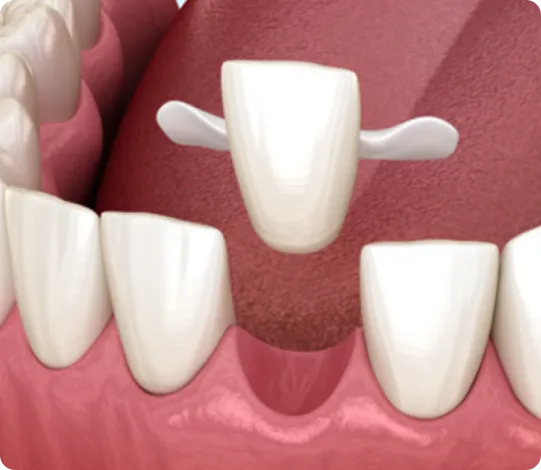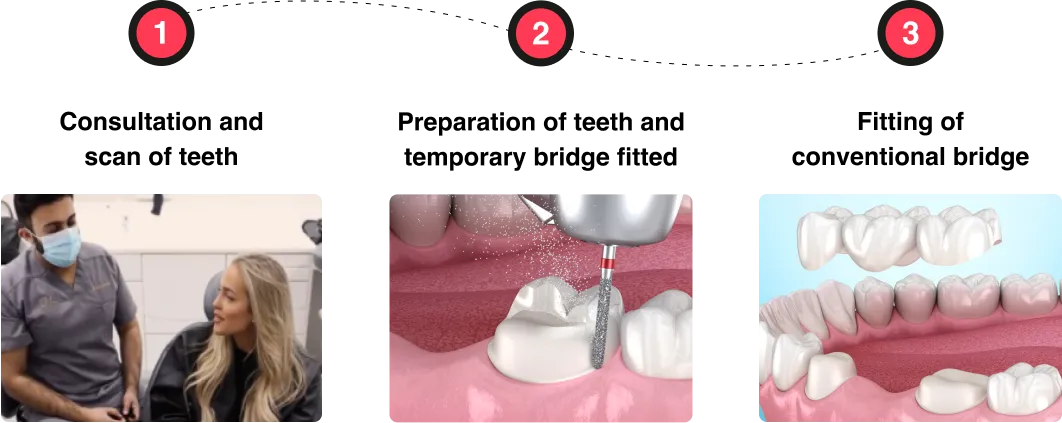Dental bridges are an option to replace missing teeth. Some types of dental bridges rely on adjacent teeth for support and other involve dental implants for added stability.
Dental Bridges
- Quick replacement of missing teeth - 2 appointments needed
- Cost effective
- Can be used as a temporary solution where
implants are not possible or being delayed

Google rating score of 4.8 of 5, based on 350+ reviews
0%
FINANCE OPTIONS
Evening and Weekend
APPOINTMENTS
Free
CONSULTATIONS
What Are Dental Bridges?
Dental bridges are prosthetic devices designed to fill the gaps left by missing teeth, helping to restore both functionality and aesthetics to your smile. Consisting of one or more artificial teeth, dental bridges are anchored in place by neighboring natural teeth or dental implants.
They serve as a stable and durable solution for individuals with missing teeth, enhancing both oral health and appearance.

Main benefits of
dental bridges
- Restored Functionality: Dental bridges effectively restore the proper functioning of your bite and oral activities, allowing for improved speech, chewing, and overall oral functionality.
- Aesthetic Enhancement: Bridges enhance your smile by filling gaps left by missing teeth, providing a natural-looking and aesthetically pleasing appearance.
- Cost-Effective Solution: Compared to some alternative tooth replacement options, dental bridges are often a more cost-effective choice. This makes them a practical solution for individuals looking to restore their smile without a significant financial burden.
- Time-Efficient Treatment: The process of getting dental bridges is typically 2 appointments, much faster than other alternatives such as dental implants or dentures. Patients can experience a relatively quick improvement in their smile and oral function without lengthy treatment timelines.
- Minimal Invasive Procedure: Placing dental bridges usually involves minimal disruption to existing teeth. Unlike some other treatments, such as dental implants, bridges generally require less invasive procedures.
- Preventive Measure Against Teeth Shifting: Dental bridges help prevent adjacent teeth from shifting into the gaps left by missing teeth, maintaining the overall alignment of your natural teeth.
- Easy Maintenance: Dental bridges are relatively easy to clean and maintain. Regular brushing, flossing, and professional dental cleanings help ensure the longevity of the bridge and promote overall oral health.
- Versatile Application: Dental bridges can replace one or multiple missing teeth, making them a versatile solution for various cases of tooth loss. Whether addressing a single gap or multiple adjacent gaps, bridges can be customized to meet diverse needs.
- Preservation of Adjacent Teeth: Unlike some alternatives, resin retained dental bridges often require minimal if any alteration to adjacent teeth. This preservation of natural tooth structure contributes to the overall health and longevity of surrounding teeth.
- Customized Shade Matching: Dental bridges can be color-matched to blend seamlessly with existing teeth, ensuring a natural and harmonious appearance. This customization enhances the cosmetic appeal of the overall smile.
- Accelerated Treatment Process: Compared to certain alternative treatments, dental bridge placement often requires fewer appointments, offering a quicker resolution for individuals seeking a timely restoration of their smile.
Types Of Dental Bridges

Resin Retained Bridge
Resin-retained bridges offer a minimally invasive and aesthetically pleasing option for individuals with missing teeth. Unlike traditional bridges that rely on dental implants or cut back natural teeth for support, resin-retained bridges are attached using metal or ceramic wings bonded to the back of adjacent teeth.
This approach is particularly suitable for cases where the surrounding teeth are healthy and strong. Resin-retained bridges are a viable option when the gap is small, and the neighbouring teeth can provide adequate support.
While they may not be as robust as implant-supported bridges, they offer a conservative alternative, preserving the structure of adjacent teeth, providing a natural appearance and are initially less costly than dental implants
Resin Retained Bridge Process

Conventional Bridge
Conventional bridges serve as a robust solution for individuals dealing with missing teeth. In cases where dental implants may not be feasible or necessary, a conventional bridge can effectively restore both function and aesthetics. Comprising one or more artificial teeth, the bridge relies on the support of adjacent natural teeth, which are crowned to anchor the dental bridge in place.
This not only fills the gap left by missing teeth but also helps maintain the alignment of surrounding teeth. While not as invasive as dental implants, conventional bridges provide a reliable option for patients seeking a fixed and durable solution for their missing teeth.
Conventional Bridge Process

Implant Retained Bridges
- Stability for Missing Teeth:Stability for Missing Teeth: Dental implants serve as anchors, ensuring the implant-supported bridge remains securely in place. This stability is particularly beneficial for those with multiple missing teeth.
- Preservation of Jawbone: Dental implants, acting like natural tooth roots, prevent the bone loss commonly associated with missing teeth.
- Natural Appearance: Implant-supported bridges closely replicate the appearance of natural teeth. The prosthetic teeth, firmly attached to the dental implants, create a seamless and lifelike smile, addressing both aesthetic and functional issues related to missing teeth.
- Long-Term Solution: Implant-supported bridges, when properly cared for, offer a durable, long-term solution for replacing missing teeth. This durability surpasses that of traditional dental bridges and removable dentures, making them an attractive option for individuals with extensive tooth loss.
- Improved Oral Health: Unlike traditional bridges, implant-supported bridges don't rely on neighbouring natural teeth for support. This preservation of adjacent teeth contributes to overall oral health, making it an advantageous option for those with multiple missing teeth.
- Enhanced Comfort: The secure integration of dental implants into the jawbone eliminates discomfort or irritation often associated with removable dentures.
- Boosted Confidence: The stability, natural appearance, and restored functionality provided by implant-supported bridges can significantly elevate an individual's confidence and self-esteem.
- Reduced Dietary Restrictions: The stability of implant-supported bridges allows individuals to enjoy a diverse range of foods without the dietary limitations commonly associated with removable dentures. This freedom is particularly advantageous for those with multiple missing teeth, enhancing their overall quality of life.
how much do dental bridges cost
Comparing options for missing teeth
Dental Bridges FAQ
What is a dental bridge?
A dental bridge is a prosthetic device designed to replace one or more missing teeth. It typically consists of artificial teeth (pontics) anchored to adjacent natural teeth or dental implants.
How is a dental bridge different from dentures?
Unlike dentures, dental bridges are fixed and not removable. They are anchored to adjacent teeth with specialised dental adhesive or connected to implants, providing a more stable and permanent solution for tooth replacement.
What are the different types of dental bridges?
Loose teeth can result from various factors, including gum disease, trauma, teeth grinding, osteoporosis, poor dental hygiene, smoking, and underlying medical conditions.
Is the dental bridge placement procedure painful?
Loose teeth can result from various factors, including gum disease, trauma, teeth grinding, osteoporosis, poor dental hygiene, smoking, and underlying medical conditions.
How long does it take to get a dental bridge?
The process typically involves 2-3 visits. After an initial consultation, the teeth are prepared accordingly, impressions or scans are taken, and a temporary bridge may be fitted. The final bridge is custom-made in a dental laboratory, and this requires another appointment to return for for fitting.
How long do dental bridges last?
With good oral hygiene and regular reviews, dental bridges can last 10-15 years or more. However, they may need replacement or adjustment due to wear and tear
Does getting a dental bridge hurt?
If it is a conventional bridge, the procedure is usually performed under local anesthesia, so patients should not feel pain during the process. Resin retained bridges rarely if ever need anaesthetic, so shouldn’t hurt.
Can I eat normally with a dental bridge?
Yes, once you get used to your dental bridge, you can eat a whole variety of foods. However, we recommend to avoid extremely hard or sticky foods that could potentially damage the bridge.
How do I care for a dental bridge?
Proper oral hygiene is essential. Brushing and flossing around the bridge and under the pontic are crucial to prevent plaque buildup and maintain good hygeine
Can anyone get a dental bridge?
Dental bridges are suitable for many individuals with missing teeth, but not everyone is a candidate. It is quite often dependent on the health of the anchoring teeth that are supporting it. This is not the case with dental implants.
Can I replace a missing back tooth with a dental bridge?
Loose teeth can result from various factors, including gum disease, trauma, teeth grinding, osteoporosis, poor dental hygiene, smoking, and underlying medical conditions.
Is a dental bridge the only option for replacing a missing tooth?
Loose teeth can result from various factors, including gum disease, trauma, teeth grinding, osteoporosis, poor dental hygiene, smoking, and underlying medical conditions.
Will getting a dental bridge affect the surrounding natural teeth?
Loose teeth can result from various factors, including gum disease, trauma, teeth grinding, osteoporosis, poor dental hygiene, smoking, and underlying medical conditions.
What factors determine the cost of a dental bridge?
Loose teeth can result from various factors, including gum disease, trauma, teeth grinding, osteoporosis, poor dental hygiene, smoking, and underlying medical conditions.
Can I get a dental bridge if I have gum disease?
Gum disease can affect the stability of the anchoring teeth, so we would advise addressing this issue beforehand. Healthy gums are crucial for the success and longevity of the bridge and any other dental work.
Are dental bridges covered by insurance?
Dental insurance policies can vary, so It’s would be sensible to check with an insurance provider for specific details on coverage.
Is there an age limit for getting a dental bridge?
Loose teeth can result from various factors, including gum disease, trauma, teeth grinding, osteoporosis, poor dental hygiene, smoking, and underlying medical conditions.
Can a dental bridge be replaced?
Yes, dental bridges can be replaced if they become damaged, worn, or if there are changes in oral health. This can be evaluated by a dentist who can then advise the appropriate course of action
Do dental bridges feel natural?
Dental bridges are designed to feel and perform like natural teeth. After a period of time patients adapt to the presence of the bridge, and it feels like your natural teeth.
How do I clean a dental bridge?
Regular brushing and flossing are required to maintaining a dental bridge. Special tools like floss threaders or interdental brushes may be used in addition to regular maintenance with a hygienist.
Can a dental bridge be repaired if damaged?
The ability to repair any damage depends on its extent. In some cases, repairs may be possible, while in others, replacement may be required.
Can a dental bridge change the appearance of my face?
No, as long as it is well-fitted, it should not significantly alter the facial structure when properly placed.
Are dental bridges only for front teeth?
Dental bridges can be used to replace any missing teeth in any part of the mouth, including front and back teeth. The type of bridge utilised will depend on the anchoring teeth and replacement required.
Can I still get cavities with a dental bridge?
Loose teeth can result from various factors, including gum disease, trauma, teeth grinding, osteoporosis, poor dental hygiene, smoking, and underlying medical conditions.
Can I get a dental bridge if I have a dental implant?
Loose teeth can result from various factors, including gum disease, trauma, teeth grinding, osteoporosis, poor dental hygiene, smoking, and underlying medical conditions.
What if I decide to remove my dental bridge in the future?
Loose teeth can result from various factors, including gum disease, trauma, teeth grinding, osteoporosis, poor dental hygiene, smoking, and underlying medical conditions.





